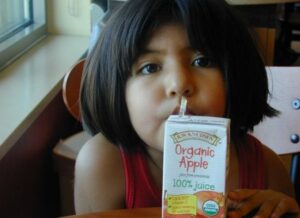FDA Sets New Limits on Arsenic in Apple Juice

The FDA has announced that it’s setting new limits on the acceptable levels of arsenic allowed in apple juice, more than a year after pressure began from consumers and advocacy groups concerned over the arsenic’s effect on children. The agency is taking comments on the draft regulation for 60 days, reports the Huffington Post.
Highly popular, apple juice is only outsold by orange juice in the category, with apple juice more commonly being purchased for young children. Companies selling apple juice containing more than 10 parts per billion of inorganic arsenic—commonly found in pesticides—could have their products pulled from stores and face legal action under the new regulation. But the FDA said most apple juice products are already far below that level. In a study conducted last year by the FDA, 95 percent of the samples had arsenic levels below the new regulation.
“Overall the supply of apple juice is very safe and does not represent a threat to public health,” said FDA Commissioner Dr. Margaret Hamburg, in an interview with The Associated Press. “We decided to put forward this proposed action level to give guidance to industry and to assure ongoing safety and quality.”
Inorganic arsenic has potentially toxic effects and has been connected to an increased risk of cancer when consumed at high doses or for a long period of time.
The FDA first set a “level of concern” in 2008 for arsenic at 23 parts per billion. Pressure last year from the Consumers Union, which publishes Consumer Reports, asked the FDA to set the limit at 3 parts per billion.
Keep in touch with Jill on Twitter @jillettinger
Image: Maze Walker

